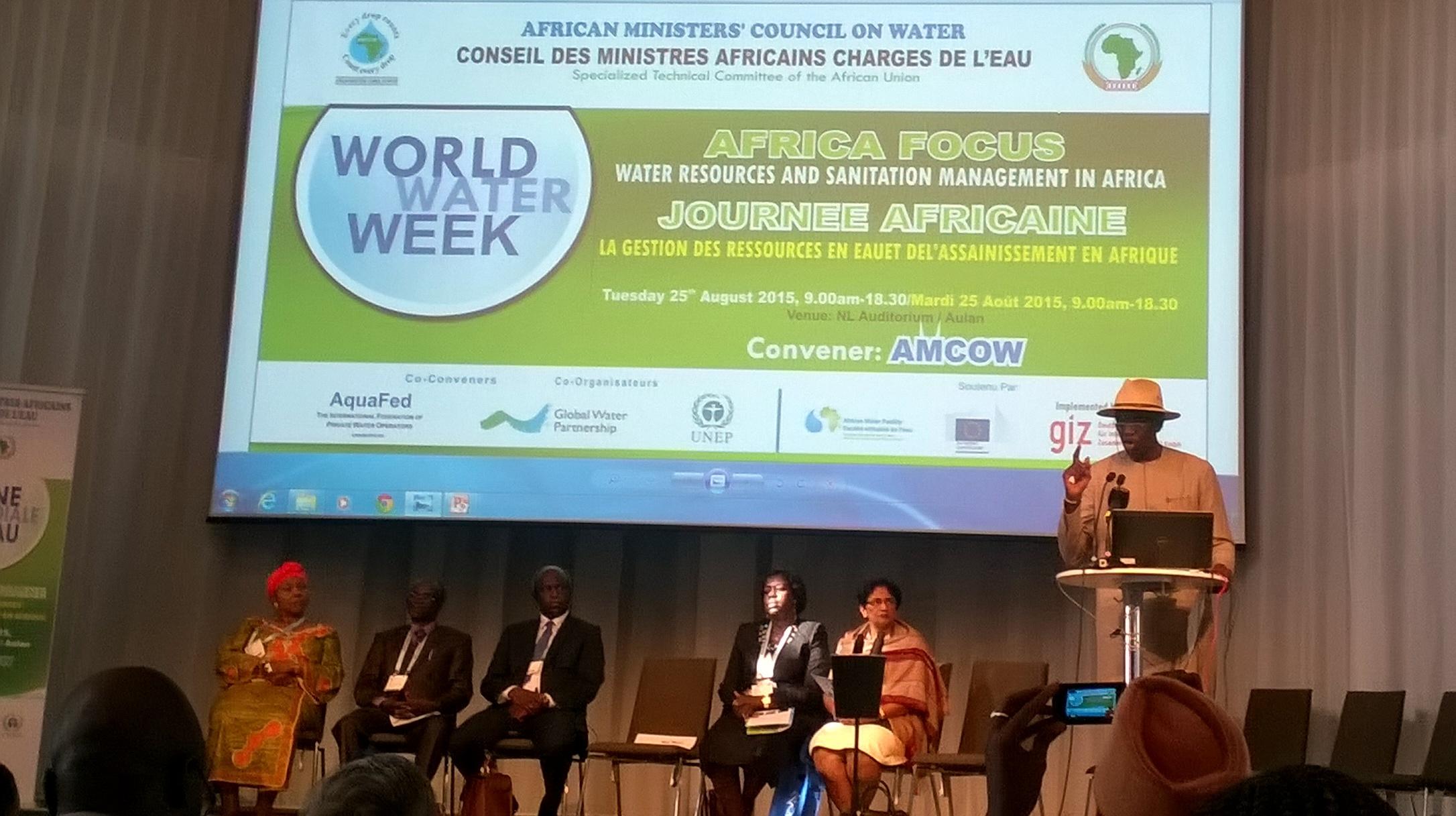Reflections from World Water Week 2015

Elijah Wanda
This year, from 23rd to 28th August, I was thrilled to be invited by SHARE to attend and present at the 25th Stockholm World Water Week (WWW). It was an excellent opportunity to meet with like-minded professional, all of whom were focused on new thinking and positive action towards water-related challenges and their impact on the world’s environment, health, climate, economic and poverty reduction agendas.
Opening ceremony
WWW was opened by speakers including the Swedish Prime Minister-Stefan Löfven of Sweden, the Jordanian Prime Minister-Abdullah Ensour, the President of Marshall Islands-Christopher Loeak, and, the winner of the 2015 Stockholm Water Prize, Rajendra Singh of India. Their main message was that we need to join hands with nature to fill our water needs.
In his key note address, Rajendra Singh pointed out that “it will become impossible to meet the greed of all individual people. We can change the war on water into peace”. Singh is a reformer doctor who accidentally got involved in water management and brought water to more than a thousand Indian villages. For his relentless efforts to help villagers in arid areas to collect rainwater for dry seasons, he was awarded this year’s Stockholm Water Prize.
Private sector participation in the delivery of sanitation and hygiene services
As well as attending numerous informative presentations and workshops, my colleague, Professor Victor Kasulo, and I presented our paper ‘Private sector participation in the delivery of sanitation and hygiene services in Nkhata Bay District in Malawi’ during the Sustainable Cities: a pipe dream or realistic future? technical workshop.
Lack of adequate sanitation continues to be an environmental and human health problem especially in the developing countries such as Malawi. Furthermore, 53% and 19% of the population have access to improved sanitation in Malawi and Nkhata Bay district, respectively. The Mzuzu University Centre of Excellence in Water and Sanitation realizes that to tackle this lagging global problem, new and innovative approaches that move beyond many of the myths or misconceptions that have undermined past attempts to increase access to improved sanitation are required. Sanitation marketing is an approach to increase sustainable access to improved household sanitation at scale and close the huge sanitation access gap in developing countries. It does so by developing the sanitation marketplace to better serve the needs of low-income households. The involvement of the private sector is required if any sanitation marketing and promotion are to succeed.
Our study was, therefore, aimed at analyzing and creating an understanding of the involvement of the private sector through the sanitation chain in program implementation and current and recommend measures to mitigate against the challenge within a rural district. The study established the potential opportunities for sanitation as a business, namely:
- An opportunity for additional innovative improved latrine designs
- Existence of improved sanitation for public toilets to meet the needs of the Nkhata Bay market area by the private actors such as the Malawi Homeless People Federation
- Lack of service providers for emptying septic tanks in Nkhata Bay District
- Nkhata Bay is a tourist attraction center, which increases demand for sanitation service
- There is still space within the sanitation market for emerging sanitation businesses and motivated entrepreneurs who are willing to invest in sanitation and hygiene promotion in Nkhata Bay District
- High population growth rates, which leads to high volumes of waste production, which could be recycled and provide items of high value such as compost and hu-manure for sale or agricultural use
- Existence of motivated development partners who are willing to promote sanitation and hygiene in the District in partnership with the District and National Government
- High unemployment as there is available labor for entering sanitation as a business, especially in the age bracket of 20 to 45 for men and women.
The study found that the following were major potential threats affecting the delivery of sanitation and hygiene services in the District:
- Population growth per anticipated land scarcity for latrine construction due to the increasing population growth rates
- Lack of financing mechanisms with very few financing and microfinance institutions supporting sanitation entrepreneurs in the District
- Limited to help sanitation sector professionals better understand rural consumer’s constraints and aspirations to further build the sector
- Lack of District sanitation infrastructure such as waste stabilization ponds to support septic tank and pit emptying services, and solid waste landfill facility.
2015, the year of global commitments for a realistic future
In addressing the role of 'Water for Development', SIWI aimed for WWW to go beyond discussions about global goals and targets, and address the actual implementation of the new post-2015 development agenda in the local context. Similarly, the Mzuzu University Centre of Excellence in Water and sanitation realizes that if we are to progress beyond ‘business-as-usual’, we must come up with innovative and realistic solutions. Adoption of the sanitation marketing approach is one tool that can help turn things round and contribute to the successful implementation of the post-2015 sustainable development goals. In sanitation marketing, public funds are used to strengthen the supply and demand sides of the sanitation market. Our various communities, too often separated in silos, need to form new alliances, innovative public-private partnerships and social businesses for an effective and socially accepted development agenda.
